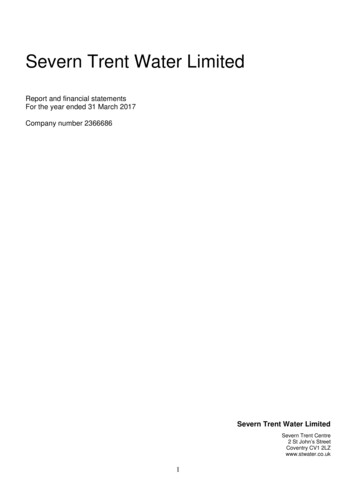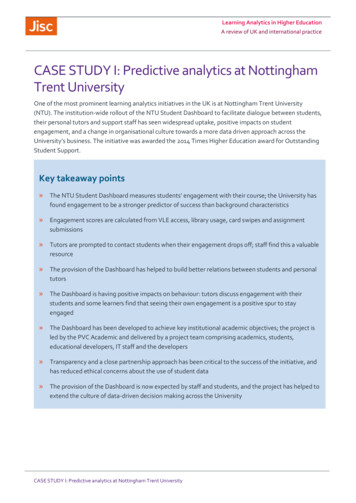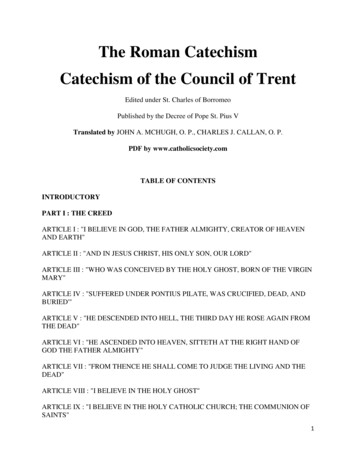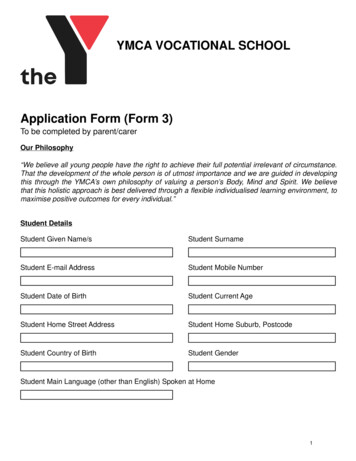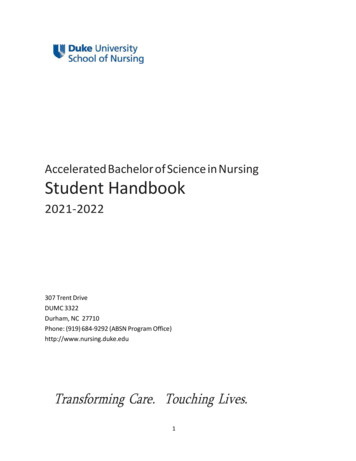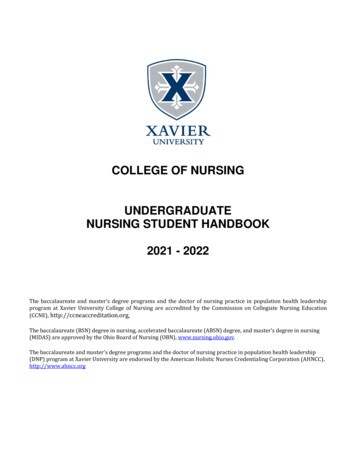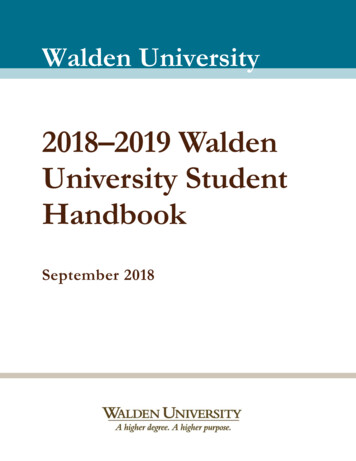
Transcription
TFSON Student Handbook2021-2022 Academic YearInspiring Nursing as if Every Person Matters .1
CONTENTSWELCOME5WELCOME FROM THE DEAN5WELCOME FROM THE TRENT/FLEMING NURSING STUDENT ASSOCIATION6About the TFNSA .6TFNSA Executive Positions . 7INTRODUCTION8VISION AND MISSION8OUR PHILOSOPHY8Philosophy of Nursing .8philosophy of Teaching/Learning .8PROGRAM OVERVIEW8Program Goals .9Profile of the Graduate . 12STANDARDS OF EXCELLENCE12Program Approval – CNO . 12Accreditation – CASN . 13ACADEMIC EXPECTATIONS14INDIGENOUS COURSE REQUIREMENT (ICR)14GRADE EXPECTATIONS14CLINICAL PRACTICE GRADES AND ATTENDANCE15The 4 P’s of the Trent Simulation Hub . 15Pre-Clinical Medication Quizzes: . 15Conference Attendance as Clinical Credit . 15Elite Performance Activities and Missed Clinical Shifts. 16PRACTICE EXPECTATIONS17ETHICS AND PROFESSIONAL GUIDELINES FOR STUDENTS17THE NURSING STUDENT AND CLIENTS17THE NURSING STUDENT AND THE PROFESSION18THE NURSING STUDENT AND CONFLICT OF INTEREST19TRENT POLICIES AND PROCEDURES201
ACADEMIC INTEGRITY POLICY20STUDENT CHARTER OF RIGHTS AND RESPONSIBILITIES20TFSON POLICES AND PROCEDURES21TFSON PROFESSIONAL CONDUCT POLICY21Nursing Student Professional Conduct . 21Nursing Student Professional Conduct21Nursing Student Professional Misconduct22Allegations of Professional Misconduct . 23Sanctions (Professional Misconduct) . 24Appeals . 25POLICIES AND PROCEDURES RELATED TO CLINICAL PRACTICE25TFSON Placement Policy. 25Clinical Course Registration . 25TFSON Non-Academic Requirements Policy . 26Deadline & Renewals26Required NARs26Submitting NARs27TFSON Dress Code . 27Policies and Procedures related to 4000 Level clinicals . 29Placements in Critical Care Settings29Placements in Canada Distant From the University29International Placement29Student Orientation to Facilities (NURS 4020/21/22C)32Making Decisions about Procedures: Considerations for Fourth-Year Students andPreceptors32TFSON Incident/Injury/Fatality Policies & procedures. 34Incident Reporting Policy34Injury Reporting Policy: Student Injury During an Unpaid Student Placement36Fatalities and Critical Injuries Reporting Policy37TFSON TRANSFER CREDIT POLICY37STUDENT ACCOMMODATION37TFSON PRE-REQUISITES WAIVER PROCESS37NURS ADVANCED TOPIC OFFERINGS38TFSON GIFT POLICY392
TFSON SOCIAL MEDIA AND ELECTRONIC TECHNOLOGY POLICY39Use of Electronic Technologies in Practice Settings: . 39LEAVE OF ABSENCE FROM NURSING STUDIES40APPEALS AND PETITIONS41TRENT UNIVERSITY41TRENT/FLEMING SCHOOL OF NURSING APPEAL POLICY41In-Course Grade Appeals (Theory Courses) . 41Final Grade Appeals. 43Appeals of Clinical Course Failures . 45Student Appeal of Finding of Misconduct .47COMMUNICATION, RECORDS AND CONFIDENTIALITY47GRADUATION AND REGISTRATION49GRADUATION AND CONVOCATION49ENTRY TO PRACTICE EXAMINATION49TEMPORARY CLASS49JURISPRUDENCE EXAM50STUDENT RESOURCES51ACADEMIC RESOURCES51Academic Advising . 51Academic Skills . 52Student Wellness Centre. 52FUNDING52STUDENT ASSOCIATIONS53Canadian Nursing Students Association (CNSA) . 53Nursing Students of Ontario (NSO) . 53Trent Central Student Association (TCSA) . 53Trent/Fleming Nursing Students’ Association (TFNSA) . 53REGULATORY BODY54College of Nurses of Ontario (CNO) . 54PROFESSIONAL ASSOCIATIONS54Canadian Indigenous Nurses Assocation . 54NurseONE . 54Registered Nurses Association of Ontario . 553
Registered Practical Nurses Association of Ontario (WeRPN Formerly RPNAO) . 55CONNECT WITH US56CAMPUS LOCATION56MAILING ADDRESS AND TELEPHONE564
WELCOMEWELCOME FROM THE DEANWelcome to the Trent/Fleming School of Nursing (TFSON) and the beginning of afulfilling career. Nursing is both rewarding and challenging. Nurses can make adifference to individuals, to communities and to the health care system. As a nurse,you will be joining the largest group of Canadian health care professionals with theopportunity to work in community, hospital, long term and complex care, education,government and many other sectors. The Trent/Fleming School of Nursing preparesnew graduates to work, from a relational inquiry perspective, in an increasinglycomplex and constantly changing Canadian health care environment.The School’s curriculum was developed, and is taught, collaboratively between Trent University and FlemingCollege. We also partner with George Brown College in offering a PN to BScN program. The School offers a fouryear Bachelor of Science in Nursing, a two-and-a-half-year compressed program open to students with previousuniversity education and a five-semester program for students who have completed the PN to BScN Bridge atGeorge Brown College. Our educational units and programs have the maximum accreditation awarded by theCanadian Association of Schools of Nursing and are also approved by the College of Nurses of Ontario.Some of you are joining us straight from high school; others have done some previous post- secondary educationand still others will be coming to baccalaureate nursing from a practical nursing background. At the 1000 level of theprogram you will be introduced to the nursing profession and learn more about health, healthy aging andprofessional practice. At the 2000 level, you will further develop your knowledge of nursing practice while focusingon health and illness in families and at the community level. At the 3000 level you will expand your knowledge ofboth acute and chronic illnesses and their associated nursing care as well as exploring your role as leaders inhealth and health care. In the final year of the program (4000 level) you will work on integrating all of the knowledgeyou acquired in the first three levels and prepare to enter practice as a novice nurse and a nurse scholar.Remember that you as students and the Trent/Fleming School of Nursing have a shared responsibility for yourlearning. The School designs and implements and/or facilitates learning environments and experiences to prepareeach of you as a novice nurse, a safe practitioner and a life-long learner. Each of you must be an active participantin this process, assuming responsibility for your own learning, increasingly engaging in self-directed inquiry as youapproach your final year and seeking timely and appropriate assistance when you encounter learning challenges.I hope that at the end of your studies you will look back at your time in the Trent/Fleming School of Nursing and beas proud of your learning and growth here as I am proud of the quality of our School’s learning environment.Dr. Kirsten Woodend, RN, MSc, PhD5
WELCOME FROM THE TRENT/FLEMING NURSING STUDENT ASSOCIATIONYou are now part of an engaging community of nursing students who are accepting and supportive of one another.We strive to promote an inclusive, positive, and safe environment for all nursing students. Our team is composed ofhardworking and dedicated students who are available to guide you through your nursing journey. If you findyourself struggling, please don’t hesitate to reach out to any of the team members. We are here to help youthroughout your nursing education and beyond.In this community, you will find resources, opportunities, and a roster of events that are designed to complementyour coursework and connect you to other peers throughout the school of nursing. As we continue to monitor theCOVID-19 situation, we hope to welcome you back on campus in the fall and winter and online with a variety ofevents.If you would like to get involved, please consider running for a position on the executive team or one of our uniquecommittees paired with faculty. Elections for open positions will take place in early September. Specific informationabout the election process and available positions will be posted on the BScN Intranet on Blackboard. Pleaseconsider following us on Instagram @tf nsa and Facebook by searching up the “Trent Fleming NursingStudent Association (TFNSA)” to subscribe for updates from the student association.As we continue to navigate this new normal, all of us are exploring new learning opportunities and innovativeleadership styles both online and in person. Please remember to remain positive, as every cloud has a silver lining.We want to thank all the staff and faculty members for their continued diligence, compassion, and support. Andto all of the students, we wish you all the best of luck with your Academic Year (2021-2022).We look forward to working alongside you!Trent/Fleming Nursing Students’ AssociationExecutive Team (2021-2021)Email: tfnsa@trentu.caFacebook: facebook.com/tfnsa/Instagram: instagram.com/tf nsa/Twitter: twitter.com/tfnsaABOUT THE TFNSAThe Trent/Fleming Nursing Students’ Association is a student group that is committed to supporting the studentsenrolled in the TFSON. The TFNSA acts as a liaison between the students and the School of Nursing. Each year,6
the TFNSA holds educational and recreational events to enhance the learning of students and to support the Schoolof Nursing Community.TFNSA EXECUTIVE POSITIONSPresidentCNSA Official DelegateDirector of Community ServiceVice PresidentCNSA Associate DelegateDirector of CommunicationRNAO Student AmbassadorGeorge Brown LeaderDirector of Social EventsSenior Director of FinanceGeorge Brown Associates (2)Alumni Representatives (2)Junior Director of FinanceCompressed Representatives (2)Lower Year Collaborative Representatives (2) &Upper Year Collaborative Representatives (2)7
INTRODUCTIONVISION AND MISSIONVision: Trent-Fleming is the leading Canadian change agent for nursing as a driver of social justice improving thehealth and quality of life for marginalized populations through research, community partnerships, and education ofclinically excellent graduates.Mission: To provide programs that meet the highest standard for nursing education and foster graduates who havedeveloped superior humanistic and scientific caring, professional and social responsibility, and critical inquiry. TheSchool collaborates via robust partnerships within and external to the University setting.OUR PHILOSOPHYInitially established in 2002 and built on the traditional strengths of Fleming College and Trent University, thephilosophy of the TFSON is rooted in the tenets of phenomenology and humanism and a belief in the critical natureof individual meaning and context that is unique to each person.PHILOSOPHY OF NURSINGNursing involves a unique combination of knowledge from the arts and sciences. The goal is to participate withpeoples in achieving the best outcomes in keeping with their experience of health. Our philosophy reflects thetenets of humanism, social justice, professional practice, relational practice, nursing inquiry, science, health andhealing.PHILOSOPHY OF TEACHING/LEARNINGLearners and faculty create a relationship process of inquiry and stimulate a commitment to life-long learning. Ourphilosophy is learner centered and respects multiple ways of discovery and knowing. Responsibility is sharedwithin the community of learners.PROGRAM OVERVIEWThe Trent/Fleming School of Nursing (TFSON) is a unique University/College partnership in the Ontario nursingeducation system. It is a fully integrated program, offering multiple points of entry to a single, unified curriculum. Alllearners, whether entering from high school, after completing a degree in another discipline or as a RegisteredPractical Nurse (RPN) in Ontario, study the same nursing and required science curriculum. At graduation, allstudents will have credit for the same 14.5 required and 5.5 elective credits.Our curriculum, built on the metaparadigm of nursing, includes six distinct themes:. These themes are threadedthroughout our curriculum, underpinning the growth of learner knowledge and skill. Our curriculum also includes fiveareas of focus, directly related to the metaparadigms of Person and Environment. These foci were defined through8
a process of broad community consultation in 2007 and revised through a similar process in 2013 and reflect boththe unique demographic profile of the Peterborough region and the traditional strengths of Trent University’sacademic programming. Learners have the opportunity to study core content in each of these areas and then,should they wish to supplement that study, choose electives that enable deeper exploration using multipleperspectives.PROGRAM GOALSStudents who have attained the following 10 program goals will have met all the CNO's entry to practicecompetencies. Students graduating from this program are:1. Prepared as generalists entering a self-regulating profession in situations of health and illness.2. Prepared to work with people of all ages and genders (individuals, families, groups, communities andpopulations) in a variety of settings.3. Expected to have an enhanced knowledge of the program foci: indigenous communities, women's healthand gender, rural health, aging and mental health.4. Prepared to learn to continuously, use critical and scientific inquiry and other ways of knowing to developand apply nursing knowledge in their practice.5. Prepared to demonstrate leadership in professional nursing practice in diverse health care contexts.6. Prepared to contribute to a culture of safety by demonstrating safety in their own practice, and byidentifying, and mitigating risk for patients and other health care providers.7. Able to establish and maintain therapeutic, caring and culturally safe relationships with clients and healthcare team members based upon relational boundaries and respect.8. Able to enact advocacy in their work based on the philosophy of social justice.9. Able to effectively utilize communications and informational technologies to improve client outcomes.9
10. Prepared to provide nursing care that includes comprehensive, collaborative assessment, evidenceinformed interventions and outcome measures.These 10 goals are levelled across years such that:GoalOn completion of 1000level courses students willbe able to:On completion of 2000 levelcourses students will beable to:On completion of 3000 levelcourses students will be ableto:1Define and describe the term'self-regulating' and what itmeans to a part of a 'selfregulating' profession.Begin to practice andexperience self-regulation in avariety of health care settings.Fully understand how topractice in a self-regulatingprofession.Begin to construct a sense ofself as nurse.Explore the broader role fornursing in a variety ofcommunities and populations.Analyze clinical situations andreflect on individual roles of thenurse as it impacts uponpatients and the nursingprofession.Rationalize the link betweenhealth and illness.2Demonstrate the ability towork with aging populationsin the residential settings.Understand and appreciatecontextual components ofworking with families, groups,communities, and populations.Understand the complexexperiences of adults of allgenders as they strive toachieve optimal health.3Recognize the meaning andrelevance of the five fociwithin the nursing program.Demonstrate anunderstanding the relevanceof five foci in relation toindividual and communityexperience of health.Use a critical perspective inapplying the foci to nursingknowledge and practice.4Define the ways of knowingand learning with a focus oncritical and scientific inquiry.Begin to apply critical andscientific inquiry to nursingknowledge and practice.Integrate critical reflectiveevidence-informed care usingmultiple ways of knowing.Understand healthexperiences using a variety ofways of knowing.10
5Recognize the experience ofleadership in nursing andundertake a leadership role inpeer groups.Discover leadership in selfand others when working withindividuals, families andcommunities.Develop and embody leadershipat the point of care.Expand awareness ofleadership in nursing.Identify strategies to developleadership potential.67Articulate the role of theindividual and theprofessional nurse inproviding safe nursing care.Understand the context andattributes of the culture ofpatient safety.Anticipate, identify and managerisk situations.Establish and maintain aprofessional relationship withpeers and an engaged,caring, and culturally saferelationship with older adults.Establish an engaged, caring,and culturally saferelationship with families andcommunities.Engages in deliberative personcentered relational practice toassist individuals, families andcommunities to achieve health.Demonstrate awareness ofresources related to riskmanagement.Acknowledge own potential tocontribute to effectivecollaborative team function.8Understand the concepts ofadvocacy and social justice.Begin to develop selfadvocacy skills.Explore the influence ofdeterminants of health onhealth and wellness ofindividuals, families andcommunities.Identify situations whereadvocacy is indicated.9Explain the relevance ofinformation and technologyskills that are essential tosafe health care.Effectively utilize informationand technology skills topromote positive outcomes.Advocate for individuals,families, and communitiesrecognizing the influence ofpublic policy on health.Recognizing contextualinfluences on persons livedexperiences within the healthcare system.Integrate and apply criticalthinking to the use ofinformation technology anddissemination strategies asrelated to clinical outcomes.11
10Explain the components ofthe nursing process.Perform an assessment of acommunity.Perform a basicbiopsychosocial assessmentof an individual.Collaborate with group toidentify priority health goalsand create evidence informedplans of care.Identify evidence informedinterventions and outcomemeasures with guidance.Critically assess the individuals,family and community healthstatus.Collaborate to identify priorityhealth needs.Identify evidence informedinterventions and healthoutcome evaluation in complexcare situations.PROFILE OF THE GRADUATEThe goals of the Trent/Fleming School of Nursing are two-fold:1. To graduate learners prepared to begin practice at the novice level in community, long term care and acutenon-critical care settings; and2. For selected learners, with interest and capacity, to additionally provide preparation suited for entry at thenovice level to critical care settings.The TFSON has adopted the definition of novice developed by Patricia Benner. A novice nurse is primarily focusedon task-oriented nursing care, has little or no “experience of the situations in which they are expected to perform”and “are taught rules to help them perform” 1.The College of Nurses of Ontario has published its expectations for entry-level RNs in COMPETENCIES FORENTRY LEVEL REGISTERED NURSE PRACTICE (Revised 2020). A copy of this publication can be downloaded,in PDF format, at ice-competencies-2020.pdf .STANDARDS OF EXCELLENCEPROGRAM APPROVAL – CNOTo register as an RN in Ontario, applicants must graduate from a university program, with a baccalaureate degreein nursing, from a program approved by the College of Nurses of Ontario (CNO). The CNO’s program approvalprocess helps to ensure that graduates are prepared to practise nursing safely, competently, and ethically andaligns with the CNO’s mandate of protecting the public.1Benner, P. (1982). From Novice to Expert. American Journal of Nursing: 82(402-7)12
In 2017, CNO piloted a new program approval process and the TFSON was a pilot site. All TFSON programs(Collaborative, Compressed and PN to BScN) were approved. The next comprehensive program approval review isplanned for 2025.For more information on the CNO program approval process, please visit: m-approval/ACCREDITATION – CASNAccreditation is recognized as a valid quality measurement and improvement tool in terms of advancing nursingeducation. The accreditation process is overseen by the Canadian Association of Schools of Nursing (CASN) andundertaken by the CASN Accreditation Bureau.The maximum accreditation that can be awarded a school or program is seven years. The TFSON was firstaccredited in 2005 and underwent its last full review in spring of 2021; the results of this review will be available inthe fall of 2021. All of the programs (Collaborative, Compressed, PN to BScN) were awarded the maximumaccreditation award after the 2013 review.For more information on the CASN accreditation process, please visit: casn.ca/accreditation/Accreditation is a measure of excellence; approval is done to assure that all of our programs meet a higheducational standard.13
ACADEMIC EXPECTATIONSStudents must meet all of the School’s program goals. All degree requirements must be met within seven years ofadmission to the program. Students are responsible for familiarizing themselves with the programs requirementsand deadlines as they appear in Trent University’s Undergraduate Academic Calendar and in this handbook. TheAcademic Calendar is accessible on the University’s website at trentu.ca/calendar.INDIGENOUS COURSE REQUIREMENT (ICR)All undergraduate students beginning studies at Trent in the Fall 2018 term or thereafter must complete at least 0.5credit from the Approved Indigenous Course List as part of their university degree requirements. Individual coursesthat meet this requirement are designated by the (ICR) after the title of the course. The Approved IndigenousCourse List can be found in the Academic Calendar and here: trentu.ca/indigenous/icr.GRADE EXPECTATIONS A minimum cumulative average of 65% is required at graduation for the BScN degree. Students must maintain a cumulative average of at least 65% in the BScN program. If at the end of anyterm a student’s cumulative average falls below 65%, they will be required to meet with the School ofNursing’s academic coordinator. Students who fail to raise their cumulative average to at least 65% in thesubsequent term will be required to meet with both the School of Nursing’s academic coordinator and theprogram coordinator and, in collaboration with them, develop and follow a plan to improve their grades.Students who at the end of a third term have failed to raise their cumulative average to at least 65% will bewithdrawn from the BScN program but not from the University. Students must achieve a minimum grade of 60% in all Nursing or designated required courses, includingthe course selected for the third year “forced choice” requirement. Students who fail 2.0 credits of courses will be withdrawn from the BScN program but not from theUniversity. Students will be allowed to repeat one Nursing theory course for which they have received a grade lowerthan 60%. Failure to raise this grade to 60% or better will result in withdrawal from the BScN. program butnot from the University. Students who receive a second grade lower than 60% in a Nursing theory course will not be allowed torepeat that course and will be withdrawn from the BScN. program but not from the University.Additional academic and grade expectations can be found in the Undergraduate Academic Calendar attrentu.ca/calendar14
CLINICAL PRACTICE GRADES AND ATTENDANCEClinical learning includes but is not limited to learning sessions in the TFSON: Trent Simulation Hub and clinicalplacement (in-person and virtual). Attendance at Trent Simulation Hub learning sessions, orientation to clinicalpractice, and clinical practice is MANDATORY. Failure to attend Hub sessions, orientation or clinical practice mayresult in removal from the related clinical practice course and theory co-requisite and/or a failing grade. Studentswho are planning to enroll in any course where a pre-semester clinical course orientation (including agencyorientation) is a requirement must be available to attend orientation(s) which may be in the week preceding theofficial first day of the semester.Students will be allowed to repeat one failed Nursing practice course over the duration of the program. A secondfailing grade in a Nursing practice course (either a repeated or different practice course) will result in withdrawalfrom the BScN program but not from the university.Students who have been given an unsatisfactory evaluation and have been removed from the clinical practicesetting for either unsafe or unprofessional behaviour may be placed only one subsequent time in that clinicalcourse.Additional information on degree requirements is listed in the Academic Calendar, trentu.ca/calendarTHE 4 P’S OF THE TRENT SIMULATION HUB PROMPT: Show up on time. Chronic lateness is unprofessional and disrespectful to others who arrive ontime. Lateness disrupts valuable lab time. PREPARED: Do the required prep-work and be prepared to answer questions in lab. Show completedquizzes to your instructor. Come with appropriate knowledge base to participate fully in lab. PARTICIPATE: Ask questions, role play, engage with your partner. Demonstrate your knowledge andskills to your lab instructor. Share your insight and experience with the class when appropriate. PROFESSIONAL: Adhere to the dress code. Keep off your cell phone. Listen when someone is talking.Use pro
College. We also partner with George Brown College in offering a PN to BScN prog ram. The School offers a four-year Bachelor of Science in Nursing, a two-and-a-half-year compressed program open to students with previous university education and a five-semester program for students who have completed the PN to BScN Bridge at George Brown College.


